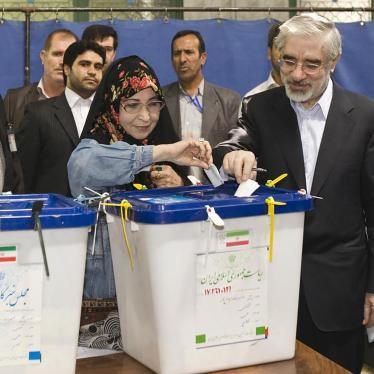(Beirut) – The Iranian parliament on August 13, 2017, approved a long-awaited amendment to the country’s drug law that significantly raises the bar for a mandatory death sentence, Human Rights Watch said today. The amendment, which the parliamentary judiciary commission revised four times, is a step in the right direction despite being more limited than a December 2016 draft amendment that sought to outlaw the death penalty for most nonviolent drug related offenses.
Iran has one of the highest rates of documented executions in the world. According to Amnesty International, in 2016 alone, Iran executed at least 567 individuals, including at least two who were children when they allegedly committed their crimes. When submitting the new draft law to the parliament, Hassan Noroozi, the spokesperson for the parliamentary judicial committee, stated that 5,000 people are currently on death row for drug offenses in Iran, the majority between the ages of 20 and 30.
“If the amendment becomes law, it could save hundreds of people from execution who never should have been on death row in the first place,” said Sarah Leah Whitson, Middle East director at Human Rights Watch. “Even Iranian officials admit the ineffectiveness of capital punishment for combating drugs, and the parliament should next outlaw capital punishment for all drug offenders, and then end all executions.”
For the bill to become law, the Guardian Council, a body of 12 Islamic jurists, must approve it, agreeing that the bill is in accordance with Iran’s constitution and their interpretation of sharia law.
Under Iran’s current drug law, nonviolent offenses, including possession of as little as 30 grams of synthetic drugs such as methamphetamines, as well as trafficking, possession, or trade of more than five kilograms of opium or 30 grams of heroin carries a mandatory death sentence.
The approved amendment changes the punishment for drug offenses that previously carried the death penalty or life in prison to a prison term of up to 30 years. However, it still mandates the death penalty if the accused or one of the participants in the crime used or carried weapons and intended to use them against law enforcement agencies. The death penalty would still apply to a leader of a drug trafficking cartel, anyone who used a child in some way to traffic drugs, or anyone facing new drug-related charges who had previously been sentenced to execution or 15 years to life for drug-related offenses.
After facing pushback from Iran’s judiciary and the Interior Ministry’s drug control headquarters, parliament altered the amendment to maintain the death penalty for nonviolent charges of “production, distribution, trafficking, and selling” drugs. However, the amendment raises the amounts of drugs involved to more than 50 kilograms of “traditional” drugs such as opium or two kilograms of synthetic drugs such as methamphetamines. It also restores the death penalty for possession, purchase, or concealing more than three kilograms of “synthetic drugs.”
Despite the prospect of reform, the authorities have continued executing people on drug-related offenses. On July 20, Human Rights Watch called on Iranian authorities to immediately halt these executions while the amendments await final approval.
Human Rights Watch has repeatedly documented serious violations of due process, torture, and other violations of the rights of people accused of drug offenses, including in Ghezel Hesar prison in Karaj. Prisoners have told Human Rights Watch that authorities routinely blindfold and beat detainees and force them to sign confessions. Prisoners also said that court-appointed lawyers are not allowed to be present during interrogations or to meet privately with their clients, and that they are allowed only to submit written statements in their clients’ defense.
Under article 6(2) of the International Covenant on Civil and Political Rights, which Iran has ratified, in countries that still retain capital punishment, the death penalty may be applied only for the “most serious crimes.” The United Nations Human Rights Committee, which interprets the covenant, has said that drug offenses are not among the “most serious crimes,” and that the use of the death penalty for such crimes violates international law. Human Rights Watch opposes capital punishment in all circumstances because it is inherently irreversible and inhumane.
“The Guardian Council shouldn’t wait a moment longer to approve reforms and take a first step to curbing Iran’s execution epidemic,” Whitson said.









